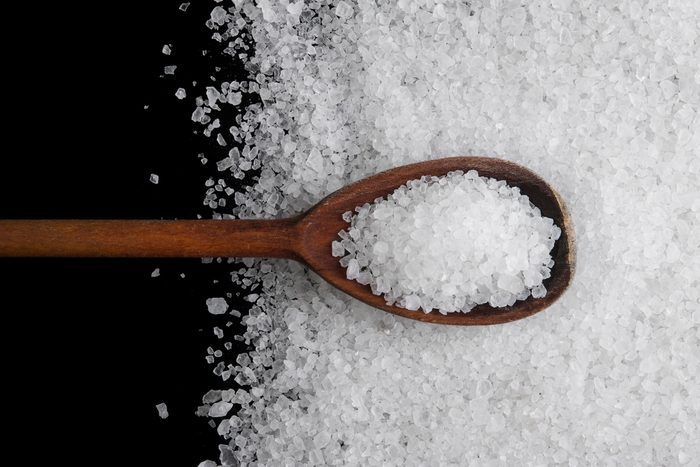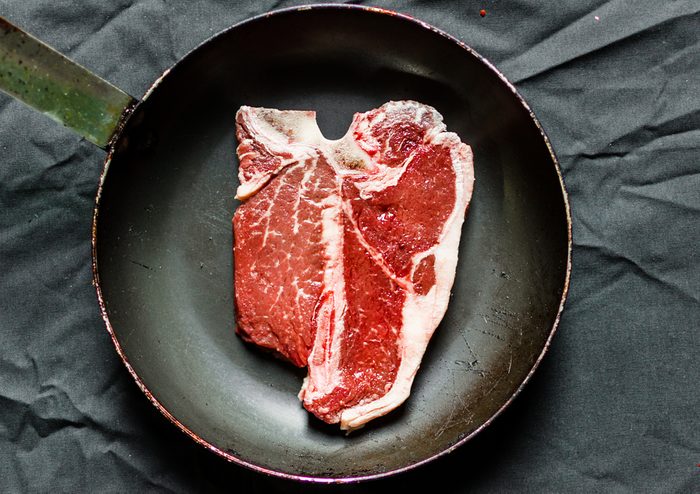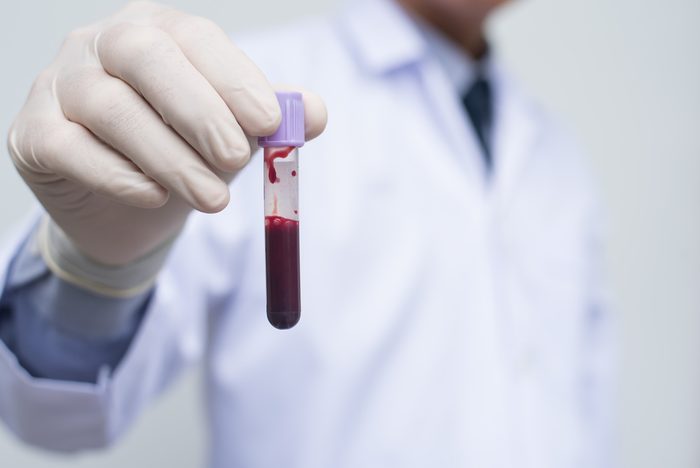
Coffee
Something this good must be bad for you—or so everyone thought. Experts have blamed coffee for stunted growth, high blood pressure, heart attacks, and more. But over the past decade, coffee’s reputation has done a complete turnaround: An analysis of studies published in BMJ last year concludes that people who drink three to four cups per day have lower mortality rates from all causes than those who drink no coffee; regular java drinking seems to lower the risk of some cancers along with liver and heart disease. The light isn’t completely green on coffee though: It can be harmful to developing fetuses (so pregnant women should use caution), and it may contribute to osteoporosis. Check out these 8 myths about coffee.

Salt
In the 1970s, a scientist fed an amount of sodium to rats that would be equivalent to about 500 grams in humans (most people in the United States eat an average of 3.4 grams per day), reports Scientific American. The rats’ blood pressure went up, and the medical community raised the alarm about salt. Americans never really embraced the message—federal guidelines recommend that we only eat 2.3 grams of sodium, or about a teaspoon of salt, per day, but restaurant meals and processed foods contain such large amounts of sodium that few people meet that limit.
Perhaps the concern is misplaced: A 2016 study in the Lancet suggests that the limits are overly stringent. Among subjects consuming high amounts of sodium, only those with high blood pressure experienced higher rates of cardiovascular problems. Surprisingly, people who consumed the lowest amounts of sodium—whether or not their blood pressure was high—also experienced more cardiovascular events and deaths. Government recommendations haven’t changed, but many researchers don’t consider them settled, according to NPR’s health care blog, Shots.

Fat
Butter, lard, coconut oil—the fear of saturated fats has fallen since heart experts realized that the trans fats in margarine were actually deadly. But that doesn’t mean saturated fat is off the hook: The New York Times reports that in spite of trendy diet advice (and wishful thinking), saturated fat can still contribute to heart attacks. People who replace saturated fat with olive or canola oil significantly cut their risk of cardiovascular disease. Read these 10 myths about fat.

Meat
When the World Health Organization announced a few years ago that hot dogs, bacon, and other processed meats appear to raise the risk of colon cancer, carnivores panicked. According to the New York Times, though, the risk of eating meat in reasonable amounts is very small—much less than what’s associated with smoking. Still, the connection could be related to the level of consumption: Other studies have found that people who eat a lot of red meat have a higher risk of dying from cancer, heart disease, respiratory disease, diabetes, infections, and other ailments than those who eat the least.

Carbs
Way back in the early 1990s, Nabisco made hundreds of millions of dollars selling the low-fat, sugar-packed Snackwells line of cookies and crackers to Americans who had been taught to believe fat was evil. The nutritional pendulum has since swung the other way—popular low-carb diets have followers choosing meat (paleo and Atkins diets) and fat (keto diet) over sugar. Extremes are typically a bad idea: Although cutting added sugar (such as that in processed food) from your diet makes sense, most researchers agree that healthy carbohydrates (like those in produce and whole grains) can play an important role in any healthy diet. Here are 7 healthy carbs nutritionists recommend.

Gluten
For people who have a specific condition called celiac disease, gluten can be very harmful—the protein causes an autoimmune reaction in their gut, which can damage the lining of the intestine. Others who don’t have celiac disease—but do feel sick after eating food with gluten (primarily found in wheat, rye, and barley)—have what’s known as gluten intolerance or sensitivity. But for most of us, the protein doesn’t appear to be inherently problematic, according to the Mayo Clinic.

Eating late at night
Nutritionists used to say that a calorie is a calorie—no matter when you consume it. New research suggests your body is better equipped to digest meals earlier in the day. The New York Times reports that the pancreas produces more insulin during daylight hours; other enzymes and digestive processes appear to be more active during the day, as well. Recent studies have found that overweight adults who ate a large breakfast, moderate lunch, and small dinner scored better on tests of blood sugar, insulin, and cardiovascular risk factors compared with those who saved their biggest meal for late in the day.

Vitamin supplements
Children in developing countries who eat a bland diet can become deficient in nutrients, and that can lead to dangerous—and preventable—conditions. Low vitamin A, for example, can lead to blindness. But Americans who eat a varied diet that includes many fortified foods really don’t need supplements, according to researchers. Americans spend about $30 billion a year on vitamin pills, according to Ars Technica, a science and technology news website. But in most cases boosting nutrient levels does nothing for overall health—and it can hurt. You should deal with any deficiencies—not enough vitamin D, for example, may raise the risk of some chronic conditions and could be a risk for people who live in areas with harsh winters. Read about 6 myths about vitamins—and 2 you should consider taking.

Mammograms
Starting during the 1980s, the American Cancer Society recommended that most women have their breasts x-rayed annually to check for early signs of cancer. According to the Mayo Clinic, all this screening ended up finding potentially cancerous lesions at extremely early stages—which many women and doctors credited with saving lives. Further research revealed that many of those lesions would never have progressed to a dangerous stage; studies involving hundreds of thousands of women in the United States and Europe found that women who didn’t start early mammograms lived as long as women who did. Because breast cancer treatment—including chemotherapy and surgery—carry their own risks (including an increased likelihood of future cancers), experts now recommend that women discuss with their doctor the best time to start screening: For women with normal risk (no familial or genetic risk factors), the U.S. Preventive Services Task Force recommends waiting until 50 years of age—and stopping at 74.

Prostate cancer tests
Similarly, in the 1990s, health experts recommended that men get an annual blood test for prostate-specific antigen (PSA), high levels of which can indicate cancer of the prostate gland. But as researchers realized that other less-dangerous conditions—including prostate inflammation and enlargement—could also raise PSA levels, they’ve backed off the recommendation, according to the National Cancer Institute. Check out these prostate cancer facts.

Vaccinations
Chinese scientists started exposing healthy people to smallpox scabs around the 10th century A.D. in one of the earliest known examples of innoculation—a form of vaccination. And for nearly as long, there have been detractors who dislike the idea of purposely exposing people to disease. The bottom line is that regular vaccinations have saved civilization from a true murderers’ row of horrific viruses: smallpox, polio, measles, and the flu to name a few. There would be zero controversy over these life-saving shots except for the efforts of a misguided doctor who, in 1998, managed to publish a fraudulent study in The Lancet that falsely claimed there was a link between autism and the MMR (measles, mumps, and rubella) vaccine. The journal retracted the study and the doctor, Andrew Wakefield, was discredited and had his medical license revoked—but the damage was done and persists to this day. Just last flu season, 80 percent of flu-related deaths in children occurred in unvaccinated kids. Next, check out the latest heart health findings that could save your life.